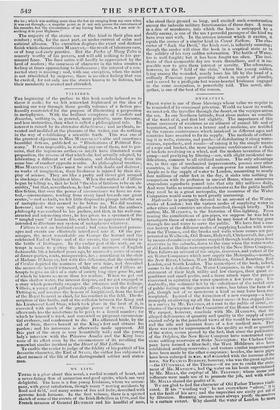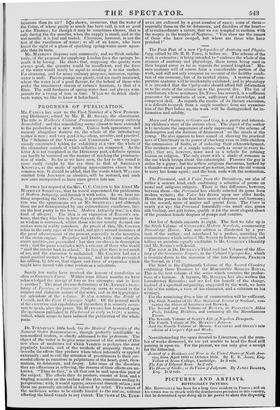HYDRAULIA.
FRESH water is one of those blessings whose value we require to be reminded of by occasional privation. Would we know its worth, we must ask the traveller through the desert, or the voyager across the sea. In our Northern latitude, frost alone makes us sensible of the want of it, and that but slightly. The importance of this prime necessary of existence as an aliment of animal life and of vegetation, and its uses as a luxury and a medicine, are testified by the various contrivances which mankind in different ages and countries have resorted to for its supply. The methods of collect- ing it in wells, cisterns, and ponds—of distributing it along water- courses, aqueducts, and canals—of raising it by the simple means of a rope and bucket, the more ingenious contrivances of a chain of buckets revolving on a wheel, and the modern invention of the pump—and purifying by filtering—are, with slight incidental mo- difications, common to all civilized nations. The only advantage we, in this age of mechanical improvements, possess over other countries, is the substitution of steam-power for animal labour. Ample as is the supply of water to London, amounting to nearly four millions of cubic feet in the day, it sinks into nothing in comparison with its profusion in ancient Rome, whose numerous stupendous aqueducts poured into that city fifty millions daily. And were baths as numerous and extensive as for the public health they need be in a great metropolis, the resources of the 'Water Companies would seem to need greatly increasing. Hydraulia is principally devoted to an account of the 'Water- works of London ; but the various modes of supplying water in other cities and countries are also described, though briefly. The author, Mr. MATHEWS, is the historian of Gas-lighting. Frog tracing the ramifications of gas-pipes, we suppose he was led to investigate those of water—so that he may boast of having gone through fire and water to serve the public. We have first a con- cise history of the different modes of supplying London with water from the Thames, and the brooks and wells whose names are per- petuated in Walbrook, Old Bourn, Holywell, Clerkenwell, and by means of conduits or cisterns supplied through leaden pipes from reservoirs in the suburbs, down to the time when the water-works of old London Bridge. were superseded by the New River Company. Then follows an account of the origin, resources, and extent of the six Water Companies which now supply the Metropolis,—namely, the New River, Chelsea, West Middlesex, Grand Junction, East London, and South London. The main object of the book, indeed, seems to be a defence of the Water Companies, in the shape of a statement of their high utility and low charges, their great ex- penditure and small profits, and a fierce attack upon the persons chucerned in agitating the water question a few years ago. Un- doubtedly, the sediment left by the subsidence of the turbid state of public feeling on the question of water, has taken the form of a job, though not of so monstrous a kind as may have been con- templated. Instead of the formation of a new company—a huge monopoly swallowing up all the lesser ones—it has stopped short in a survey by Mr. TELFORD, at a cost to the public of 5000/., ex- clusive of the expense of the Committee of the House of Commons. We cannot, however, conclude with Mr. MATHEWS, that the alleged deficiencies of quantity and quality in the supply of water existed solely in the jaundiced views of the would-be monopolists, and the idle and ignorant fears of a few medical men. That there was room for improvement in the quality as well as quantity of the water, seems proved by the fact, that since the publication of the Dolphin, the New River Company have constructed capa- cious settling-reservoirs at Stoke Newington; the Chelsea Com- pany have formed a filter-bed ; the West Middlesex also have established settling-reservoirs ; and various similar improvements have been made by the other companies; besides, the main pipe's have been enlarged in size, and extended with the increase of the town. Sir FaaNcis BURDETT, however, who was the great agitator —the O'CONNELL of the Thames—if we are to credit the state- ment of Mr. MATHEWS, had the water on his brain superinduced by Mr. MILLS, the emplo0 of Mr. TELFORD; whose name and influence were made use of to promote the job, and with whom Mr. MI sns shared the profits of it. We are glad to find the character of Old Father Thames yvindi- cated. If his " winding way" be not everywhere " silver, not the fault of his urn; and the impurities are easily got rid of by filtration. Running streams must always purify themselves to a certain extent, Why should the water of London be more
injurious than its air? It/is shown, moreover, that the water of the Cothe, of whose purity so much has been said, is not so good as the Thames ; for though it may be sometimes clearer, that is only during the dry months, when the supply is small, and in the vet months it is foul and turbid. Clearness, however, is not the test of the excellence of water ; as all of us know, who have found the sight of a glass of sparkling spring-water more agree- able than its taste.
Mr. MATHEWS disposes very summarily, and we think satisfac- torily, of the proposal for supplying London fro•n the springs be- neath it by boring. He shows that, supposing the quality were always good, the quantity would be insufficient, and the force of the water would rarely be equal to sending it to the surface. For cleansing, and for many culinary purposes, moreover, spring- water is unfit. Parish-pumps are plenty, and are easily increased, where the water is of a good flavour, for the behoof of those who prefer the translucent stream of nature's fountain, to that of a filter. The cold freshness of spring-water does not always com- pensate for a twang of iron or lime. When we do drink chaly- beate water, we like to know it beforehand.



























 Previous page
Previous page